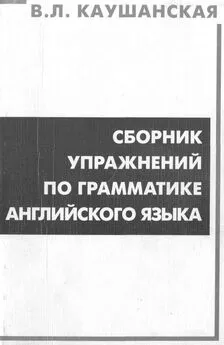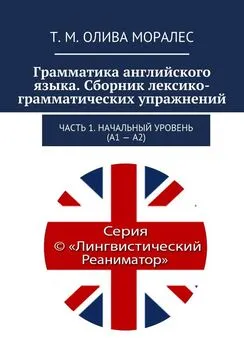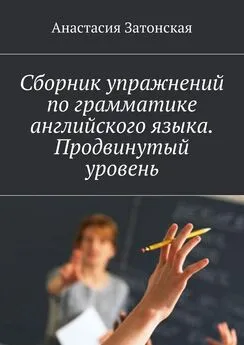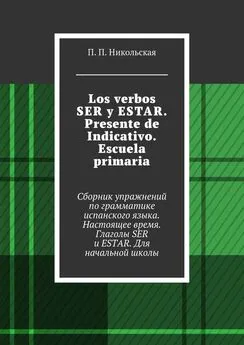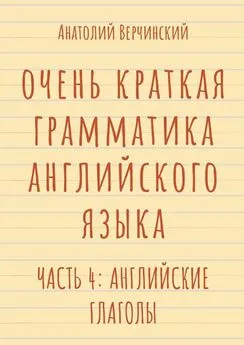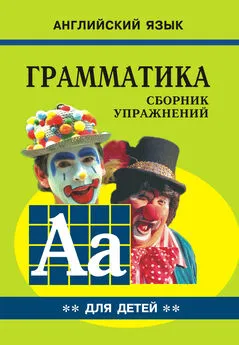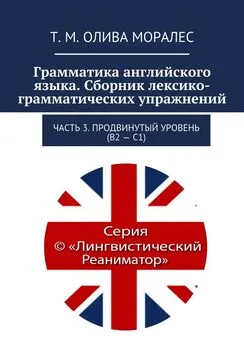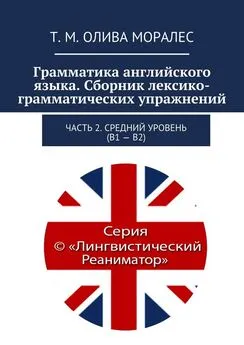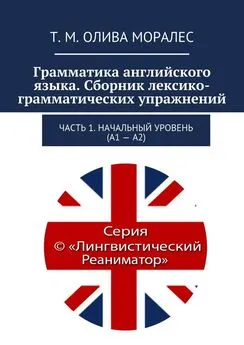В. Каушанская - Сборник упражнений по грамматике английского языка
- Название:Сборник упражнений по грамматике английского языка
- Автор:
- Жанр:
- Издательство:неизвестно
- Год:неизвестен
- ISBN:нет данных
- Рейтинг:
- Избранное:Добавить в избранное
-
Отзывы:
-
Ваша оценка:
В. Каушанская - Сборник упражнений по грамматике английского языка краткое содержание
Сборник упражнений по грамматике английского языка - читать онлайн бесплатно полную версию (весь текст целиком)
Интервал:
Закладка:
1. She put out __ hand and took out __ (her, hers; my, mine). (Hemingway) 2. "Let me see your passports," I gave him __ and Catherine got __ out of __ handbag (my, mine; her, hers; her, hers). (Hemingway) 3. Mind __ own business and I'll mind __ (your, yours; my, mine). (Lindsay) 4. Diitcher put his hand gently on _ — to calm her (her, hers). (/. Shaw)5. The next voice to speak up was not the Lieutenant's but __ (my, mine). (Salinger) 6. That, at least, is my opinion of him; and I see it is not very far removed from __ (your, yours). (Dickens) 7. __ was not a marriage that could last (their, theirs). (Bellow) 8. __ nerves are as bad as __ (your, yours; my, mine). (Greene) 9. His eyes were as bright as __ (her, hers). (Snow) 10. After all, this is __ home just as much as __ (your, yours; my, mine). (Maugham) 11. "Go with Lucy," said Mrs. Bretton. "I would rather keep __ seat." Willingly would I have kept __ also, but Graham's desire must take precedence of my own; I accompanied him (my, mine; my, mine). (Ch. Bronte) 12. His own hand shook as he accepted a rose or two from — and thanked her (her, hers). (Dickens)
1. Much more than most politicians Gave knew himself. (Snow) 2. Meanwhile, he paraded himself gloriously before this young man. (Priestley) 3. Of course, I myself used to be very wealthy... (Clark) 4. He was not doubting the logic, he realized suddenly; what he was doubting was himself. (Jones) 5. Still, he must be thankful that she had been too young to do anything in that war itself. (Galsworthy) 6. Simon calmed himself with an effort. (Sheckley) 7. But you might remember that one respects oneself more afterwards -if one pays one's way. (Galsworthy) 8. Miss Adele Gerry opened the door herself. (I. Shaw) 9. He sunned himself in Chanton's admiring gaze. (Priestley) 10. What was the use even of loving, if love itself had to yield to death? (Galsworthy) 11. This is where we wash ourselves, Eliza, and where I am going to wash you. (Shaw) 12. Gevaert cleared his throat and addressed himself to me. (Clark) 13. They blamed themselves for this unlucky marriage. (Hardy) 14. The theatre manager himself... came to shake hands with them. (Priestley) 15. I have made myself perfectly pleasant here. (Shaw) 16. Several times he reminded himself that he had not rung up Shuckleworth yet. (Priestley) 17. He could talk races with Hurstwood, tell interesting incidents concerning himself. (Dreiser) 18. I want to be kept in constant touch with his progress myself. (Clark) 19. Anne's terror of being discovered in London or its neighbourhood, whenever they ventured to walk out, had gradually communicated itself to Mrs. Clements. (Collins) 20. Soames added: "Well, I hope, you'll both enjoy yourselves" (Galsworthy) 21. Cave might have concealed from others, but not from himself, that he profoundly envied Roger. (Snow)
1. She had __ children of her own family in her house, and : __ children of other people. (Dickens) 2. I don't want __ money. (Hemingway) 3. He sat there, like __ 1 unhappy little animal. (Galsworthy) 4. A few had gone beyond the gate. __ were shouting hoarsely, and waving. (Heym) 5. "Do you want __ water?" "No, I don't want __ water." (Maltz) 6. The wounded were coming into the post, __ were carried on stretchers, __ were walking and __ were brought on the backs of men that came across the field. (Hemingway) 7. In the town there were... __ new hospitals. (Hemingway) 8. Well, if you want to know, I have no money and never had __. (Shaw) 9. "Couldn't you find tomato sauce, Barto?" — "There wasn't __," Aymo said. (Hemingway) 10. Don't let us have __ nonsense about this job. (Shaw)
1. You are __ now, and don't let __ forget it. (Priestley) 2. How can __ who has travelled so much be so appallingly juvenile, he wondered? (Murdoch) 3. In a town of a sensible size you had a good chance of meeting __ you were looking for... (Priestley) 4. He was wearing a dinner-jacket, unlike __ at the supper-party. (Snow) 5. "You've no business to say such a thing!" she exclaimed. "Why not? __ can see it." (Galsworthy) 6. There was a light tap on the door. And __ came in. (Priestley) 7. Once upon a time Clennam had sat at that table taking no heed of __ but Flora... (Dickens) 8. Here was __ to remember, to think about. (Priestley) 9. "Look here," said Hunter at last, "have you shown that picture to __ ?" (Murdoch) 10. There is __ nice, anyway, who likes being out instead of in that stuffy drawing-room, playing bridge and talking, talking. (Galsworthy)
1. The. word Germans was __ to be frightened at. We did not want to have __ to do with the Germans. (Hemingway) 2. But I can't do __ for him. (Galsworthy) 3. He was a rather small man, but there was __ naturally commanding about him. (Priestley) 4. Everyone said he could turn __ into money. (Saroyan) 5. I do not know what I expected to see, but 1 did not see __ except the fields and the bare mulberry trees and the rain falling. (Hemingway) 6. __ is wrong somewhere. (Hemingway) 7. She looked at me with violence, with __ like hate. (Snow) 8. The room was far more splendid than __ Little Dorrit had ever imagined, and would have been splendid and costly in someone's eyes. (Dickens) 9. I can bear __ but that. (Galsworthy) 10. When he read those books __ happened to him. (Galsworthy) 11. It was __ he didn't want to remember. (Cusack) 12. Even when she talks nonsense in that slightly affected way she seems to be saying __ valuable... (Aldington)
1. She was heartily sick of London fog and cold and soot and niessy open fires which fill the room with dust but don't warm it. (Aldington) 2. "Who is that girl with yellow hair and dark eyes," he asked. (Galsworthy) 3. You see, Hushabye, you are what women consider a good-looking man. (Shaw) 4. Who could tell what his son's circumstances really were? (Galsworthy) 5. You don't want to do anything that you'll be sorry for. (Dreiser) 6. A man is mostly what you want to see in him. (Heym) 7. What do you expect me to believe? (Snow) 8. She rises with an air of one who waits and is almost at the end of her patience. (Shaw) 9. It was evident, indeed, that she wished me to drop the subject, which I did accordingly. (Ch. Bronte) 10. Several times their eyes accidentally met, and then there poured into hers such a flood of feeling as she had never experienced. (Dreiser) 11. Would she go with them or stay here and write to William. Which, which should it be? (Mansfield) 12. He mentioned things in the play which she most approved of, things which swayed her deeply. (Dreiser) 13. I do so wonder what Jolyon's boy is like. (Galsworthy) 14. What hurt him most was the fact that he was being pursued as a thief. (Dreiser)
WORDS DENOTING STATE
1. The afternoon was full of transfiguring sunshine, some Judas trees were abloom in the villa gardens... (Wells) 2. I did not mind for myself. I should not have cared if had been alone. (Du Maurier) 3....his soul was all ablaze with bliss... (Twain) 4. We are not afraid of the truth. (Gow and D’Usseau) 5. The rest of his costurne... were the things he had worn at the funeral of his father. So nearly akin are human joy and sorrow. (Wells) 6. The lieutenant... Jay asleep on the other bed. (Hemingway) 7. He lit a pool of paraffin on the scullery floor and instantly a nest of wavering blue flame became agog for prey. (Wells) 8, He [Mr. Polly] rattled and stormed and felt the parlour already ablaze behind him. (Wells) 9. But Mr. Polly's establishment looked more like a house afire than most houses on fire contrive to look from start to finish. (Wells) 10. You know- everything there is to know about me. There's not much, because I have not been alive for wery long. (Du Maurier) П. He did not answer. I was aware again of that feeling of discomfort. (Du Maurier)
THE VERB
To worry, to precipitate, to forbid, to retire, to retell, to do away, to whitewash, to whiten, to ascend, to apologize, to engage, to enfold, to give in, to decompose, to translate, to transport, to browbeat, to subscribe, to subordinate, to run away, to underestimate, to backbite, to mislead, to forget, to succeed, to disobey, to take off, to overrun, to satisfy, to recede, to come in, to resign, to superintend, I to descend, to blackmail, to put up, to unbind, to win, to counteract, to go on, to forecast, to befriend, to go away, to lie, to predispose.
She went into the drawing-room and lighted the fire; then, picking up the cushions, one by one, that Mary had disposed so care-1 fully, she threw them back onto the chairs and the couches. That] made all the difference; the room came alive at once. As she wasi about to throw the last one she surprised herself by suddenly hugging it to her, passionately, passionately. But it did not put ou the fire in her bosom. Oh, on the contrary!
The windows of the drawing-room opened onto a balcony overlooking the garden. At the far end, against the wall, there wasi a tall, slender pear tree in fullest, richest bloom; it stood perfect,' as though becalmed against the jade-green sky. Bertha couldn't! help feeling, even from this distance, that it had not a single bud] or a faded petal. Down below, in the garden beds, the red and yellow tulips, heavy with flowers, seemed to lean upon the dusk. A grey cat, dragging its belly, crept across the lawn, and a black; one, its shadow, trailed after. The sight of them, so intent and scj quick, gave Bertha a curious shiver. Really — really — she had everything. She was young. Harry and she were as much in love as ever, and they got on together splendidly. She had an adorable baby. They didn't have to worry about money. They had this absolutely satisfactory house and garden. (Mansfield)
She had spoiled his life, wounded his pride to death, de frauded him of a son. (Galsworthy) 2. The door opened, and a thick set heavy-looking young man entered... (Eliot) 3. The paddock was fairly well filled with people and they were walking the horses around in a ring under the trees behind the grandstand. (Hemingway) 4. Fleur did not answer. She stood for a moment looking at him and he mother... (Galsworthy) 5. After turning the matter over and con suiting with Irene, he wrote to his daughter, Mrs. Val Dartie.. (Galsworthy) 6. The soldiers pushed the foreign workers into groups and led them off. (Heym) 7. Hughson marched him up to a sort of jarge desk that was all glass and shining metal. (Priestley) 8. While she stood hesitating, the door opened, and an old man came forth shading a candle with one hand. (Hardy) 9. Fleur looked at her watch and rose. (Galsworthy) 10. It was Fleur's turn now. She spoke of dogs, and the way people treated them. (Galsworthy) jl. The stream which worked the mill came bubbling down in a dozen rivulets. (Galsworthy) 12. He was waiting for us... at the public house; and asked me how I found myself, like an old acquaintance. I did not feel, at first, that I knew him as well as he knew me, because he had never come to our house since the night I was born, and naturally he had the advantage of me. (Dickens)
Читать дальшеИнтервал:
Закладка:
